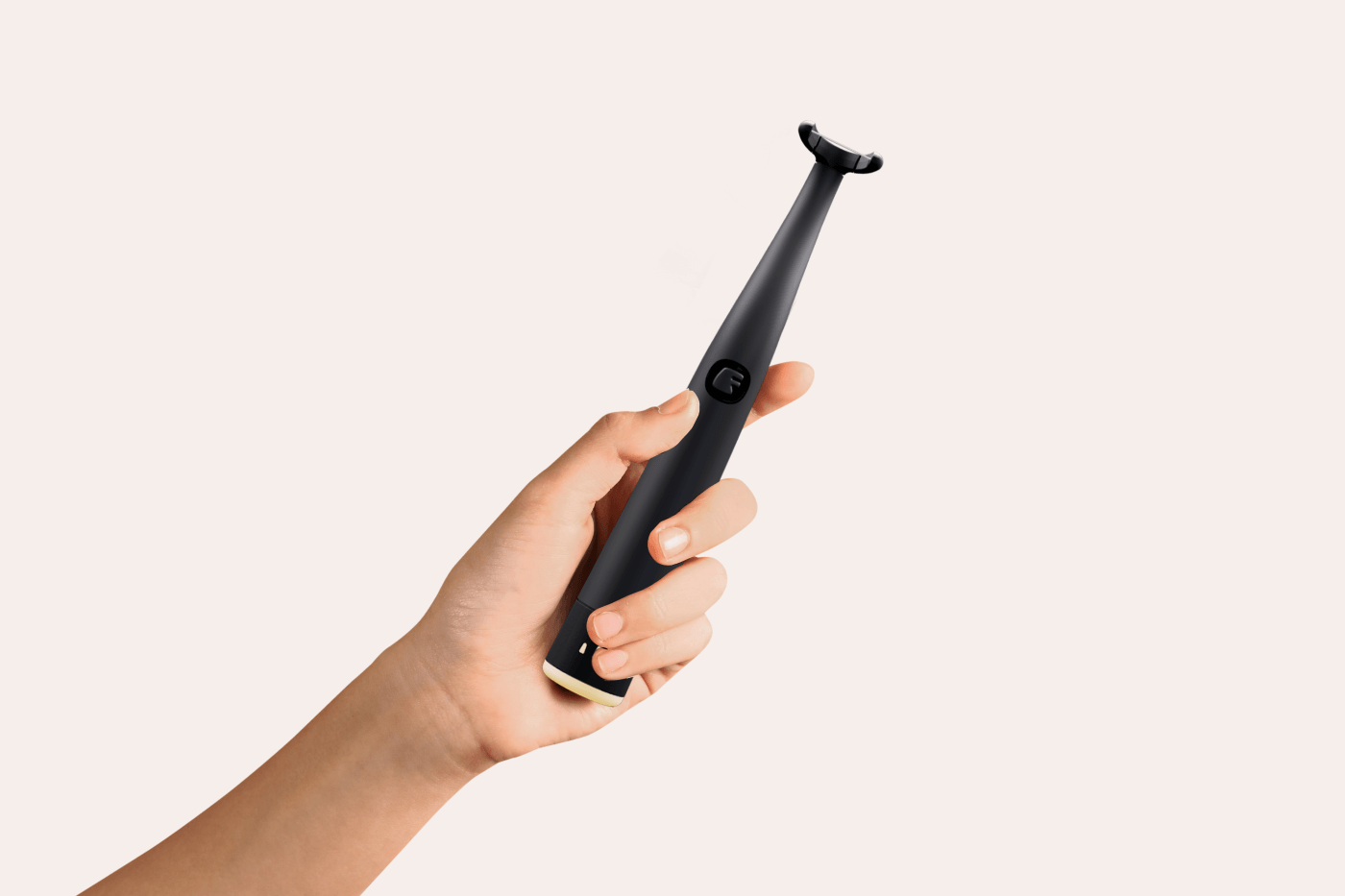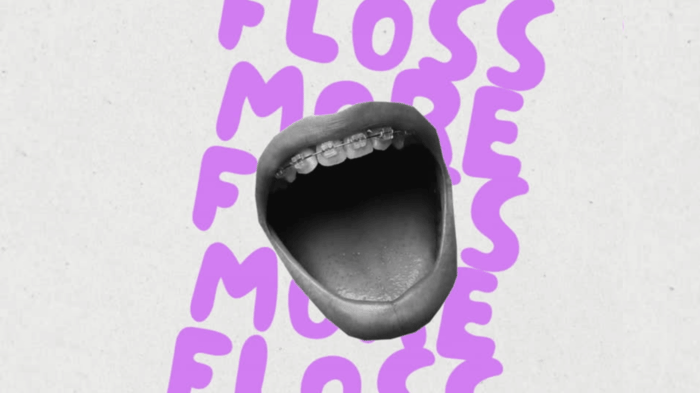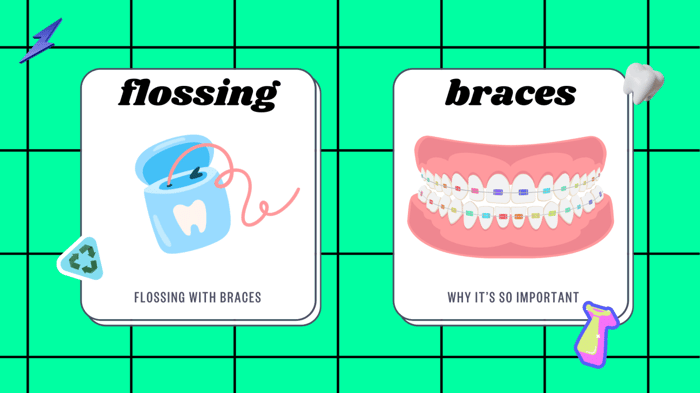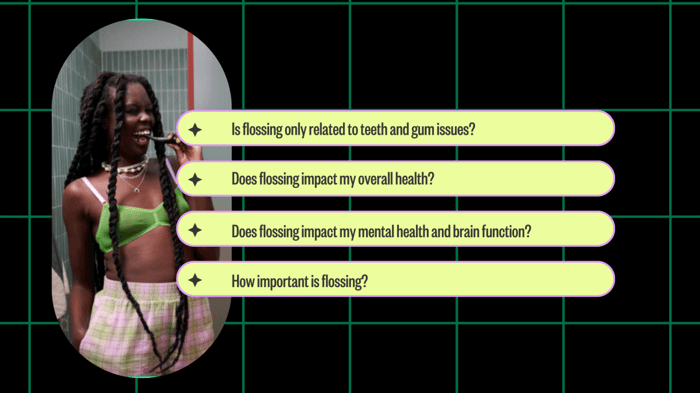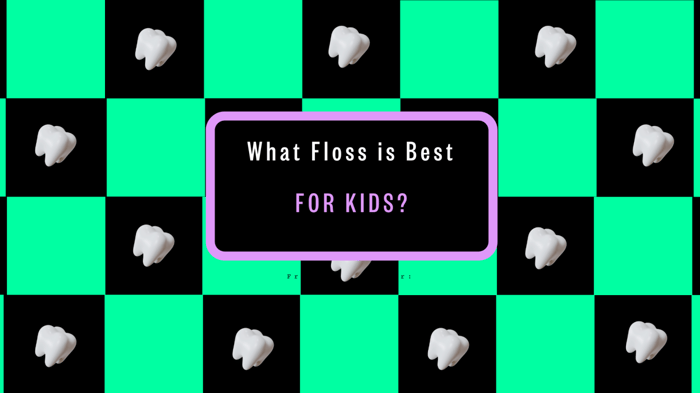How long should you floss your teeth for optimal dental health? It depends on your flossing method! If using traditional string floss, you should spend around two minutes to properly floss your teeth each day. This duration allows you to effectively remove plaque and food particles that a toothbrush can't reach, thus playing a crucial role in maintaining oral hygiene. Perhaps surprising is the fact that the technique of flossing also matters; curving floss around each tooth in a C-shape and carefully sliding it beneath the gumline is the best way to ensure you're not leaving any harmful debris behind. If you're using an electric flosser, like Flaus, you can also achieve this optimal C-shape method, but it can take less time to floss daily, due to the 18,000 sonic vibrations per minute in the flosser. So, give your teeth the time they deserve each day! Let's delve deeper into why this matters.
It is recommended to floss your teeth at least once a day, and the ideal duration for flossing should be around 1-3 minutes depending on your flossing method to ensure thorough cleaning between each tooth and along the gumline. This helps to remove plaque and debris effectively for optimal oral hygiene.
The Importance of Flossing
So, how long should you floss your teeth? We all understand the importance of brushing our teeth, but flossing is equally vital. Here's why:
When you brush your teeth, you clean most of their surfaces, but there are areas that a toothbrush can't reach—like between your teeth and under the gum line.
Food particles can get stuck in these hard-to-reach places and eventually turn into plaque—a sticky film that contains bacteria. Over time, this plaque hardens into tartar, leading to gum disease and tooth decay. Flossing helps remove this plaque before it becomes problematic.
To put it into perspective, imagine your teeth are like a shiny new car. Brushing is like washing the outside, which is important, but what about cleaning inside the engine? If not maintained properly, the internal parts can get rusty and damaged, just like how plaque and tartar damage your teeth and gums if not cleaned out regularly.
Similarly, failing to floss can lead to gum disease, also known as gingivitis or periodontitis. This can cause red, swollen gums that bleed easily when brushed. In severe cases, it can even lead to tooth loss due to damage to the bone that supports the teeth.
Neglecting regular flossing is akin to forgetting to change the oil in your car engine—it may keep running for a while, but it will gradually wear down and eventually cause major problems.
It's often said that "an ounce of prevention is worth a pound of cure," and this holds true for flossing. By taking just a couple of minutes each day to floss, you're preventing much more significant problems down the road.
In summary, flossing isn't just about removing food particles; it's an essential step in preventing gum disease, tooth decay, and bad breath. By incorporating flossing into your daily routine, you're setting yourself up for maintaining healthy teeth and gums in the long run.
With the importance of flossing underscored, let's now turn our attention to the correct techniques for effective flossing.
Correct Flossing Techniques
Flossing is an art that many people tend to overlook, but doing it properly is crucial to maintaining good dental hygiene. Let's break it down step by step.
To begin, if you are using traditional string floss, wrap the ends of the floss around your middle fingers and hold the floss tightly between your thumbs and forefingers.
Gently slide the floss between your teeth using a back-and-forth motion. Don’t snap or force the floss into place, as that can damage your gums. Take it slow at first, and you'll get used to it - before long, it will become second nature.
As you guide the floss down between your teeth, curve it around each tooth in a C-shape and move it up and down against the tooth surface. This helps remove plaque and food particles from areas that your toothbrush just can't reach.
Once in place, be sure to carefully guide the floss beneath the gumline on both sides of the tooth. Plaque and debris love to hide here, so giving a little extra attention in this area is essential. However, remember to be gentle so as not to cause damage to your gums.
Remember: Overly aggressive flossing can lead to bleeding gums and even damage to the delicate tissue, so take time for precision and care.
Now that we have explored the correct technique of flossing, it's clear that taking time and care is key when keeping our pearly whites in their best shape.
If you are using an electric flosser, like Flaus, you follow the same above steps, but instead of wrapping the floss around your fingers, you power up your flosser and use the bite pad to gently help guide the floss between your teeth. Many people with tight teeth prefer using an electric flosser, as it can help floss get into tight spaces. You can still do the optimal C-Shape flossing method with Flaus!
Ideal Frequency of Flossing
What do dental experts have to say about how long should you floss your teeth? Dental experts commonly advise flossing once a day to effectively remove plaque and food particles that can lead to cavities and gum disease. Plaque is a sticky film containing harmful bacteria that forms on teeth. If not removed, it can harden into tartar and eventually lead to tooth decay and gum disease. Proper and consistent daily flossing ensures that these harmful bacteria and debris are thoroughly eliminated from areas the toothbrush can't reach, promoting good oral health.
By flossing once every day, you're actively preventing the buildup of plaque in between your teeth. This simple yet crucial step significantly reduces the chances of developing cavities and gum disease. By removing food particles and plaque, you're ensuring that your teeth and gums stay in optimal health, and this routine prevents tooth decay and other dental problems. Thus, making a habit of daily flossing significantly contributes to maintaining your oral health over time.
Just like cleaning behind the refrigerator or changing the oil in your car, flossing daily has long-term benefits that go beyond simply maintaining cleanliness. Imagine each plaque-filled day as an opportunity for harmful bacteria to wreak havoc in your mouth. It's like skipping watering your garden - doing so just once can affect the health and growth of your plants, which is true for your oral health too.
In today's busy world, it's easy to overlook this simple task, believing that brushing alone is enough to keep your teeth clean. However, neglecting to floss daily can lead to detrimental oral health consequences. It's essentially allowing bad bacteria to multiply unchecked and cause issues down the line—issues that could have been easily avoided with a small investment in daily flossing.
Making time for those few minutes of flossing each day might seem trivial, but its positive impact on your dental health is anything but insignificant. Let's now delve deeper into some additional reasons why making a commitment to daily flossing has profound implications for your overall oral health.
If making time for flossing has been a challenge, an electric flosser, like Flaus, might be a good option for you to try! It allows you to floss up to 5x faster and also makes flossing as easy and comfortable as brushing your teeth.
Potential Risks of Over-Flossing
Flossing is crucial for maintaining good oral hygiene, but it's important to remember that more isn't always better. Over-flossing can lead to a range of dental issues, especially if done excessively or with too much force. Gum recession, irritation, and damage to the gum tissue are potential risks associated with over-flossing.
When you floss too aggressively or more often than necessary, you may end up exerting undue pressure on your gums, causing them to recede over time and exposing the sensitive root surfaces of your teeth. Gum recession not only impacts the aesthetics of your smile but also increases the risk of tooth decay and sensitivity.
In addition to gum recession, over-flossing can lead to gum irritation and inflammation. The delicate gum tissue can become sore and tender, making it uncomfortable to eat, speak, or even brush your teeth. It's essential to remember that proper technique is more important than excessive frequency when it comes to flossing.
While maintaining a regular flossing routine is crucial for removing plaque and food particles from between the teeth, it's equally important to be gentle during the process. Forceful movements or aggressive flossing techniques can harm the gums and lead to long-term issues that could impact your overall dental health.
Think of flossing like cleaning delicate jewelry. You wouldn't use forceful scrubbing motions on a valuable piece of jewelry for fear of damaging it. Similarly, treating your gums with care during flossing is essential to prevent irritation and damage to the sensitive gum tissue.
So, remember: aim for effectiveness through gentle, thorough flossing rather than aggressive or frequent flossing. Your gums will thank you for it in the long run!
Gentleness is key when it comes to flossing, as it ensures the well-being of your oral health in the long term. Now, let's explore the tangible benefits that regular flossing can bring forth.
Noteworthy Benefits of Regular Flossing
Flossing daily is not just a habit but also a vital part of your oral care routine. It significantly contributes to maintaining good oral health and hygiene.
Here are some remarkable benefits of regular flossing:
-
Preventing Tartar Buildup: Plaque hardens into tartar, and while brushing can remove plaque from the surface of your teeth, only flossing can get in between the teeth and along the gum line where tartar often forms. By doing so, you can prevent tartar buildup, which can otherwise lead to gum disease and other dental problems.
-
Reducing the Risk of Cavities: Removing food particles and plaque from between your teeth helps in preventing cavities. By cleaning those hard-to-reach areas, flossing complements brushing in fighting tooth decay.
-
Maintaining Healthy Gums: Proper flossing helps to remove debris and plaque from under the gumline, reducing the risk of developing gum disease. It also stimulates the gums, which contributes to their good health.
-
Preventing Bad Breath: Food particles stuck between your teeth can contribute to bad breath. Regular flossing helps remove these particles, leading to fresher breath and a cleaner feeling in your mouth.
-
Promoting Overall Oral Health: Regular flossing is not just about keeping your teeth clean; it's an essential part of maintaining your overall oral health. It is linked to lower instances of heart diseases and diabetes, making it an important preventive measure for maintaining overall well-being.
I hope these insights encourage you to make flossing a regular part of your daily dental routine, as it contributes significantly to long-term oral health. Now that we've explored the key benefits, let's move on to how you can integrate regular flossing into your daily routine seamlessly.
Flossing as a Part of the Oral Care Routine
When it comes to maintaining good oral health, brushing your teeth is essential, but flossing is just as important—an essential part of keeping your teeth and gums in top shape.
Let's think about it this way: Every day, small particles of food get stuck between your teeth and around your gumline. These bits of food feed the bacteria in your mouth, causing them to produce acid that can wear away at your teeth and irritate your gums. That's where flossing comes in.
Imagine using a vacuum cleaner to reach those nooks and crannies that a regular broom can't quite get to. The same principle applies to flossing—it helps get rid of the tiny food particles and plaque that your toothbrush might miss.
If you don't floss, these particles will stay put and start forming plaque—a sticky film on your teeth that contains harmful bacteria. Over time, this plaque hardens into tartar, creating a breeding ground for even more bacteria, putting you at risk of cavities, gum disease, and bad breath.
By flossing daily, you're actively preventing plaque buildup and reducing the risk of dental problems, like cavities and gum disease. This simple act helps to keep your teeth healthy and strong.
And here's something else to think about: When you take care of your teeth now, you're investing in their long-term health. Regular flossing can go a long way in preventing costly dental treatments down the road, saving you both time and money.
Quick Tip: Incorporate flossing into your bedtime routine to ensure that you remove any food particles from between your teeth before going to sleep.
Making flossing a part of your daily oral care routine offers comprehensive protection against oral health issues and supports the longevity of your smile.
From understanding the importance of flossing in maintaining optimal dental health, let's now explore how to enhance the overall experience for improved effectiveness.
Enhancing Your Flossing Experience
So, you've made flossing a regular part of your oral care routine, and you're ready to take it up a notch. Consider using an electric flosser, like Flaus, to truly elevate your flossing experience. Unlike traditional floss, an electric flosser does the work for you, providing a convenient and effective way to clean between teeth, promoting better oral hygiene. It also makes the entire process more comfortable and accessible for individuals. This modern approach to flossing is designed to make the whole experience smoother and more accessible.
The Flaus electric flosser has been praised by over 10,000 users for its ability to make flossing quick, easy, and comfortable. It's designed precisely to reach those tight spots and tough-to-reach molars, ensuring that no area is left unclean. Dr. Vivian Roknian, a dentist, recommends Flaus, likening its benefits to those of an electric toothbrush.
Not only does the Flaus electric flosser make flossing more accessible and gentle on your gums, but it can also contribute to minimizing your environmental footprint. Using 95% less floss and being made with recyclable plastic, it's both a sustainable and practical choice for your dental care routine.
In addition, the ergonomic handle of the Flaus electric flosser provides full control over hard-to-reach places while keeping fingers out of the mouth. This ensures that you can maintain a comfortable grip and reach every crevice without any hassle. When it comes to speed and efficiency, the Flaus electric flosser stands out with its 18,000 sonic vibrations and three speed options for effective cleaning. This high-performing tool brings together technology and dental expertise in one compact device.
Imagine being able to maintain optimal dental health with ease - that's exactly what the Flaus electric flosser offers. It's not just about convenience; it's about making sure that every tooth gets the attention it deserves without causing discomfort or inconvenience.
So if you're looking to elevate your oral care routine and ensure that your teeth are as healthy as possible, an electric flosser may be just what you need to take your dental hygiene to the next level.
The Role of Diet in Dental Health
We are all aware that what we eat affects our bodies, but did you realize it also has a significant impact on our smiles? The foods that benefit our teeth and gums often coincide with those that keep our entire bodies healthy.
Calcium acts as a superhero when it comes to maintaining the strength of our teeth. It's akin to armor for our teeth, shielding them from potential harm and decay. You can obtain calcium from foods like milk, cheese, yogurt, and leafy greens such as kale and spinach. These foods don't just fortify your bones; they also help strengthen your teeth.
Vitamin C also plays a crucial role. It is present in fruits like oranges, strawberries, and kiwis! Vitamin C aids in keeping our gums healthy by supporting the blood vessels therein. If your gums bleed when you brush or floss, it could indicate a deficiency in vitamin C!
We adore sweet treats as much as anyone else does, but it's crucial to savor them in moderation. Sugary foods can lead to cavities if we do not thoroughly clean our teeth every day. From candy to soda, everything sweet should be enjoyed occasionally rather than daily.
Likewise, acidic foods pose a risk to dental health. Items like citrus fruits, tomatoes, and vinegar can wear down tooth enamel if not balanced with other food types and good oral hygiene.
Apart from being mindful of what we eat, equally important is what we drink. Sipping on water throughout the day can help flush away food particles and acids before they accumulate into stubborn plaque. Limiting sugary drinks and opting for water instead is advantageous for overall health and dental well-being.
Maintaining good dental health isn't just about brushing and flossing - it’s about nourishing our bodies with foods that benefit both our overall health and the strength of our teeth and gums. A balanced diet rich in calcium and vitamin C while being mindful of sugary and acidic treats is key to protecting our smiles for years to come.
Are there different recommendations for "how long should you floss your teeth" depending on the individual?
Yes, there are different recommendations for how long to floss depending on the individual. The American Dental Association (ADA) suggests that individuals should floss at least once a day, but the actual time required may vary based on factors such as the number of teeth, spacing, overall oral health and type of floss. A study conducted in 2022 found that spending an average of two minutes to floss effectively reduced the risk of gum disease by 40%. Therefore, it is important for individuals to adapt their flossing routine to their unique dental needs while ensuring sufficient time is spent cleaning between teeth.
Is there a specific technique or method that should be used when flossing for a certain duration?
In the witty book, it's mentioned that while there isn't a specific technique or method that should be used when flossing for a certain duration, the key is to ensure thorough cleaning between each tooth and along the gum line. The American Dental Association (ADA) recommends flossing at least once a day, regardless of how long one spends on it. A study by the National Institute of Dental and Craniofacial Research found that those who flossed daily had significantly lower levels of gum disease compared to those who didn't. So, consistency matters more than an exact time limit!
What are the potential consequences of not flossing for the recommended length of time?
The potential consequences of not flossing for the recommended length of time include a higher risk of tooth decay, gum disease, and bad breath. Statistically, people who do not floss regularly are more likely to develop cavities between their teeth, as brushing alone cannot effectively remove plaque in those hard-to-reach areas. Additionally, inadequate oral hygiene can lead to the buildup of tartar, which can irritate the gums and eventually cause gum disease. Finally, skipping flossing contributes to the accumulation of food particles, leading to unpleasant breath. Flossing daily for the recommended two minutes is crucial for maintaining optimal dental health and preventing these issues.
Can over-flossing or flossing for too long have negative effects on oral health?
Over-flossing or flossing for too long can actually have negative effects on oral health. While regular flossing is essential to remove plaque and prevent gum disease, excessive pressure or prolonged flossing can lead to gum damage and recession. A study conducted in 2022 found that individuals who flossed more than once a day had a higher risk of gum irritation and bleeding compared to those who flossed once daily. Therefore, it is important to follow proper flossing techniques and not overdo it for optimal dental health.
Are there any studies or scientific evidence supporting the recommended length of flossing time?
Yes, several studies have supported the recommended length of flossing time. A comprehensive review published in the Journal of Periodontology in 2023 analyzed various research studies and concluded that two minutes of flossing, at least once a day, effectively removes plaque and reduces gingivitis. Additionally, a 2022 study conducted by Oral Health America found that individuals who flossed for less than two minutes had a higher prevalence of dental caries compared to those who adhered to the recommended time. Thus, it is advisable to spend around two minutes flossing your teeth for optimal dental health.











